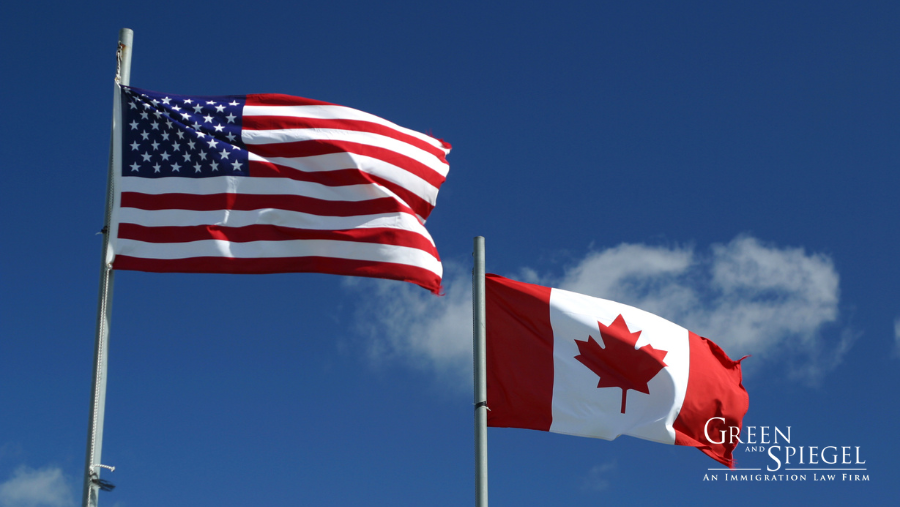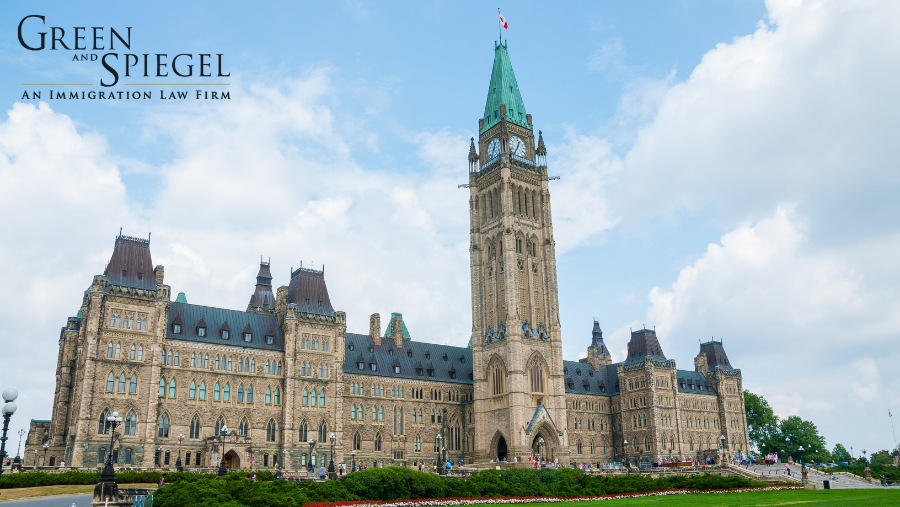
Due to Canada’s close proximity and similar cultural fabric to the U.S., as well as the strong economic relationship between Canada and the U.S., Canada is a top immigration destination for individuals contemplating a move from the U.S.
Below we explore some of the most common ways to immigrate to Canada from the U.S.
Permanent Immigration to Canada
Express Entry
Skilled workers who meet the minimum eligibility criteria of one of the following classes (and intend to reside outside of Quebec) may be eligible to apply for permanent residence via Canada’s Express Entry system:
- Canadian Experience Class:
- 12 months of skilled work experience in Canada in the past 3 years +
- minimum Canadian Language Benchmark (CLB) score of 5 (NOC TEER 2 or 3) or 7 (NOC TEER 0 or 1) in English and/or French
- Federal Skilled Worker Class:
- 12 months of continuous skilled work experience in Canada or abroad in the past 10 years +
- CLB 7 in English and/or French +
- Canadian or Canadian equivalent secondary or post-secondary degree/diploma/certificate +
- minimum score of 67 points on Federal Skilled Worker selection criteria +
- sufficient settlement funds
- Federal Skilled Trades Class:
- 2 years work experience in a skilled trade in the past 5 years +
- Job offer for 1 year OR certificate of qualification in a skilled trade issued by a Canadian provincial, territorial or federal authority +
- Minimum English or French proficiency: CLB 4 in reading and writing; CLB 5 in speaking and listening
- sufficient settlement funds
Specifically, eligible skilled workers may create a candidate profile in the Express Entry system to express their interest in applying for Canadian permanent residence to Immigration, Refugees, and Citizenship Canada (IRCC). Based on the information in their profiles, candidates are ranked against other candidates in the pool and receive a Comprehensive Ranking System (CRS) score based on their age, education, language abilities in English and/or French, Canadian skilled work experience, foreign skilled work experience, whether the candidate has a job offer in Canada, and whether the candidate has a sibling in Canada who is a Canadian citizen or permanent resident. Points may also be awarded for a spouse or common-law partner’s education, language abilities, and Canadian work experience.
Every few weeks, IRCC invites top-ranking candidates in the pool to apply for permanent residence. If invited, candidates have 60 days to submit their permanent residence application, after which IRCC’s estimated processing time is approximately 5 months.
The Express Entry system is a quick option to obtain Canadian permanent residence for many individuals seeking immigration to Canada from the U.S., as the comprehensive ranking system gives significant weight to English and/or French language abilities and post-secondary education that equates to a Canadian degree/diploma/certificate. Individuals with work experience in healthcare, STEM occupations (science, technology, engineering, and math), trade occupations, transport occupations, and agriculture/agri-food occupations may also be eligible to receive an invitation in a category-based draw that targets one of these economic priority areas and which tends to have a lower cut-off score than the general Express Entry draws.
Provincial Nominee Programs (PNP)
Canadian provinces and territories each manage their own provincial nominee programs to attract immigrants who wish to live and work in a particular province, and who meet the province’s unique economic needs. Some of these streams operate outside of the Express Entry system, while others operate in tandem with the Express Entry system and are used to boost an Express Entry candidate’s overall CRS score by 600 points once the nomination certificate is issued.
While program eligibility criteria vary greatly from one province to the next, as well as across the various PNP streams within each province, all PNP streams require the applicant to have an intention to reside in the nominating province once permanent residence is granted.
As the overall processing time for provincial nominee streams tends to be longer than under the Express Entry system, provincial nominee streams may be a good option for individuals who either do not meet the minimum eligibility criteria for Express Entry or who do not have a high enough CRS score to receive an invitation to apply for permanent residence via the Express Entry system.
Start-up Visa Program
Entrepreneurs who have the skills and experience to build businesses in Canada that are innovative, can create jobs for Canadians, and can compete on a global scale may be eligible to apply for permanent residence via Canada’s Start-up Visa (SUV) program.
To be eligible to apply under the SUV program, applicants must pitch their business idea to a designated organization and receive the designated organization’s support. They must also meet the minimum language requirement (CLB 5 in English or French), have sufficient funds to settle in Canada, and intend to reside outside Quebec.
Applicants who have submitted a permanent residence under the SUV program and have received an acknowledgement of receipt from IRCC may also be eligible to obtain a 3-year open work permit to allow them to start working on their business in Canada while their permanent residence application is in process.
Family Class Sponsorship – Spouse/Common-law/Conjugal partner
Foreign nationals who are married to or in a common-law relationship with a Canadian citizen, permanent resident, or a person registered in Canada as an Indian under the Canadian Indian Act may be eligible to apply for permanent residence based on a sponsorship by their spouse, common-law, or conjugal partner.
Sponsors must be over 18 years of age, must not be receiving social assistance for reasons other than a disability, must be able to provide for the basic needs of the person they are sponsoring, and must not be subject to any of the sponsorship bars. Sponsors and applicants must also be able to demonstrate that their relationship is genuine and was not entered into primarily for the purpose of immigration.
Canadian citizens who are living outside of Canada may apply to sponsor their spouse, common-law, or conjugal partner for permanent residence from outside of Canada as long as they plan to live in Canada when their spouse, common-law, or conjugal partner becomes a permanent resident.
Parental Sponsorships & Super Visas
Canadian citizens, permanent residents, or persons registered in Canada as an Indian under the Canadian Indian Act who are living in Canada and are over 18 years of age may be eligible to sponsor their parents or grandparents for permanent residence if they can demonstrate that they have enough money to support the people they are sponsoring. To apply under this program, sponsors must submit an interest to sponsor form and receive an invitation to apply from IRCC. However, as demand for this program far outweighs the number of spots available, invitations in recent years have been issued randomly to applicants who submitted an interest to sponsor form in 2020 only. The 2024 application intake is also now closed.
As it can be difficult to receive an invitation to sponsor a parent or grandparent for permanent residence, parents and grandparents of Canadian citizens, permanent residents, or persons registered in Canada as an Indian under the Canadian Indian Act may instead wish to apply for a temporary super visa that allows them to visit their children or grandchildren in Canada for 5 years at a time. The child or grandchild in Canada must invite their parent or grandparent to Canada, provide a promise of financial support for the duration of the visit, and meet minimum income requirements based on their family size. The parent or grandparent must also have a health insurance policy valid for a minimum of 1 year from the date of entry that covers health care, hospitalization, and repatriation and provides a minimum of $100,000 of emergency coverage.
Immigration To Canada As A Temporary Resident
There are also many temporary residence options open to individuals wishing to move to Canada from the U.S. who may not yet qualify for permanent residence. Some of these options include: study permits; work permits issued under CUSMA to eligible professionals, intra-company transferees, or trade investors; LMIA-based work permits; working holiday work permits for youth aged 18-35; and Francophone mobility work permits for individuals who are fluent in French and wish to work outside of Quebec.
While the above permits allow foreign nationals to study or work in Canada on a temporary basis only, studying or working in Canada often paves the pathway for individuals to become eligible to apply for Canadian permanent residence.
If you or a loved one is interested in immigrating to Canada and want to know more about which immigration pathway is the best fit for you, please contact us.





